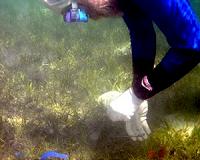 |
Cape Town (AFP) May 13, 2011 Environmental activist Lewis Pugh, known as "the human polar bear" for his swims in icy water, on Friday slammed plans to drill for shale rock gas deposits in the arid central South African Karoo. "Fracking is not sustainable. The time and the era of fossil fuels is over," he told the Cape Town Press Club, referring to the method to release gas deposits trapped in shale rock. "We can survive without gas, we simply cannot survive without water." Exploration rights for gas deposits in the vast, dry Karoo desert are being eyed by several companies including Anglo-Dutch giant Shell, sparking a local anti-drilling backlash over environmental fears. "Shell have a shocking record here in Africa -- you only have to look at what happened in Nigeria," said Pugh, who has swum at the North Pole and in a glacial lake on Mount Everest to highlight effects of climate change Seen as a means to release untapped energy sources, hydro-fracturing involves pumping water, sand and chemicals deep underground at high pressure to break out gas from the rock but is controversial. On Wednesday, French lawmakers in the lower house of parliament backed a ban on the method, a day after scientists in the United States said methane leaks were contaminating drinking water near drilling sites. "I believe that this case is going to court. I firmly believe that Shell is not going to win this case," said England-born Pugh, a maritime lawyer who studied in Cape Town and Cambridge. South Africa has put a moratorium on all new shale gas applications and on any decision to current applications while a study is under way.
Poland to push ahead with shale gas exploration "I already know who is lobbying against the extraction of shale gas. Please don't tell me it's Europe. There are people, institutions, interests which also manage to create effective lobbying in Europe," Prime Minister Donald Tusk told reporters, without elaborating who he had in mind. "But we will proceed according to our own terms," he added. Poland has already granted over 90 shale gas exploration licences to major international energy companies in the hope of bringing its considerable reserves to market. According to Polish media reports, Russia's giant state natural gas monopoly Gazprom and France's nuclear energy lobby oppose the development of the shale gas market, fearing it could cut into their bottom line. The 2004 EU nation of 38 million people, currently covers 30 percent of its gas needs from domestic resources. Initial studies suggest the shale deposits run in a huge 650 kilometre-long (404 miles) diagonal belt across Poland, stretching from the northern Baltic Sea coast to the eastern border with Belarus and Ukraine. Experts estimate the deposits could produce some 5.3 trillion cubic metres of natural gas. On Wednesday, the French lower house of parliament passed on first reading a bill to prohibit hydraulic fracturing, a practice long used in the United States whereby water is pumped deep underground at high pressure to break out gas from the rock. Environmental groups say that chemicals used in the process are a pollution threat.
Share This Article With Planet Earth
Related Links Powering The World in the 21st Century at Energy-Daily.com
 Deepwater Horizon Spill Threatens More Species Than Legally Protected
Deepwater Horizon Spill Threatens More Species Than Legally ProtectedDurham NH (SPX) May 13, 2011 Marine species facing threats from the 2010 BP Deepwater Horizon oil spill in the Gulf of Mexico far exceed those under legal protection in the United States, a new paper in the journal BioScience finds. University of New Hampshire professor Fred Short and others found 39 additional marine species beyond the 14 protected by federal law that are at an elevated risk of extinction. These spec ... read more |
|
| The content herein, unless otherwise known to be public domain, are Copyright 1995-2010 - SpaceDaily. AFP and UPI Wire Stories are copyright Agence France-Presse and United Press International. ESA Portal Reports are copyright European Space Agency. All NASA sourced material is public domain. Additional copyrights may apply in whole or part to other bona fide parties. Advertising does not imply endorsement,agreement or approval of any opinions, statements or information provided by SpaceDaily on any Web page published or hosted by SpaceDaily. Privacy Statement |